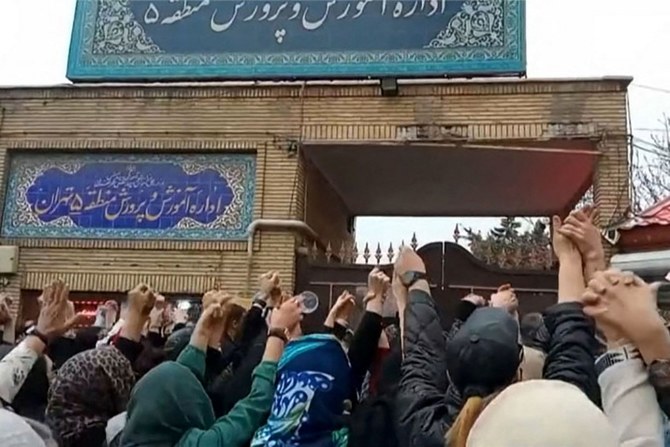LONDON: Footage of young girls in Iran frantically forcing their way out of schools has gone viral on social media amid a series of poisonings of female students.
The video, shared on Twitter by BBC Persian reporter Parham Ghobadi, showed schoolgirls coughing on the floor after running out of their classrooms.
This horrifying footage shows dozens of Iranian girls gasping for breath at a school.
Thousands of girl students have been poisoned in Iran in apparent gas attacks since November. The scope and scale is expanding on a daily basis. pic.twitter.com/YvBQLzZFrl
— Parham Ghobadi (@BBCParham) March 5, 2023
Mohammad-Hassan Asafari, a member of parliament in Iran and part of the committee investigating the poisonings, told the ISNA news agency on Monday that the spate of incidents has so far affected more than 5,000 pupils, both girls and boys, across about 230 schools in 25 provinces.
The unexplained incidents were reported in at least 15 cities and towns on Sunday alone, sparking protests and demands for action from the authorities.
Another video of girls forcing their way out of a school in Hamadan city, in western Iran, was shared by human rights activist group 1500 Tanvir on Twitter.
The caption said the girls from Fatemieh Art School were shouting “We do not want to die.”
March 5, 2023. Fatemieh Art School in Hamedan.
Schoolgirls shout: “We don't want to die!”pic.twitter.com/ssF6a0YYUt— 1500tasvir_en (@1500tasvir_en) March 5, 2023
Other videos circulated on social media showed packed emergency rooms with distressed families.
Asafari said that “various tests are being carried out to identify the type and cause of the poisonings. So far, no specific information has been obtained regarding the type of poison used.”
Ayatollah Ali Khamenei, Iran’s supreme leader, said on Monday the poisonings were an “unforgivable crime” and that “those behind this crime should be sentenced to capital punishment and there will be no amnesty for them,” the state-run IRNA news agency reported.
Iranian President Ebrahim Raisi last week requested regular updates on the situation from the Ministry of Interior.
The authorities announced on Tuesday the first arrests over the suspected school poisonings.















